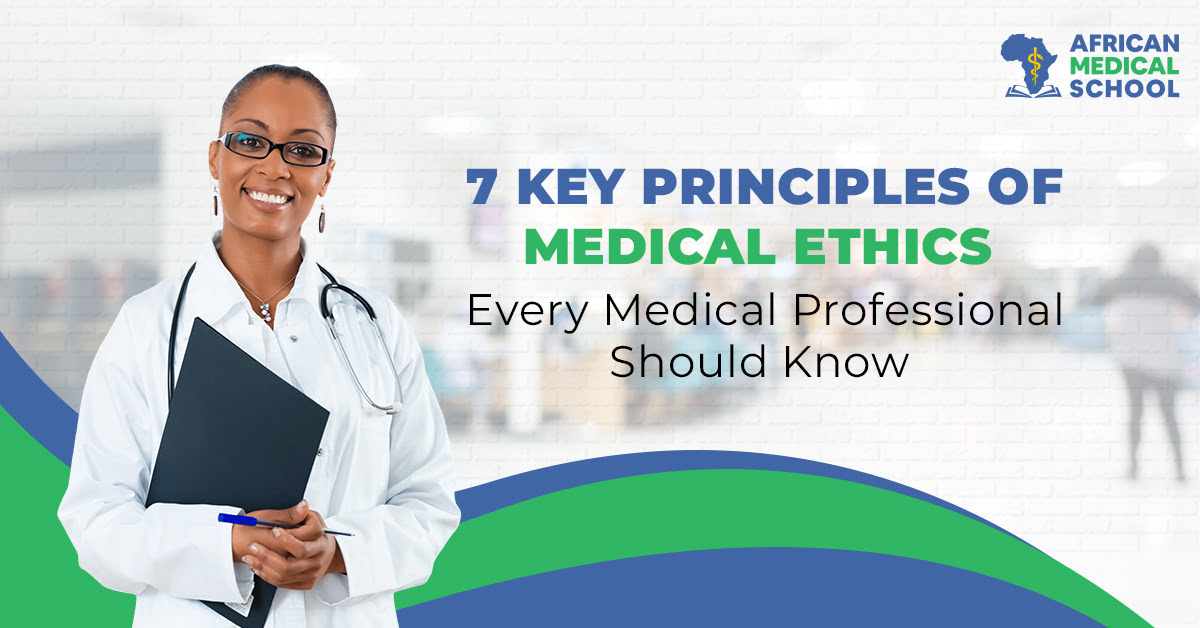|
|
Blog Summary
Medical ethics is not just a set of rules but a moral imperative that upholds the core values of the medical profession. Adherence to these ethical principles is not an option; it is a fundamental requirement for those entrusted with the health and well-being of individuals. This article will explore the seven principles of medical ethics that every medical professional should know. From beneficence to confidentiality, these principles underpin patients’ integrity and trust in their healthcare providers.
So, whether you are a seasoned practitioner or a medical student embarking on this noble journey, understanding these principles is paramount to your success in the field. Let us embark on this ethical exploration, a voyage essential for every conscientious healthcare provider.
Definition of Medical Ethics
Medical ethics, encompassing fundamental principles and values, is the moral compass guiding healthcare professionals in their practice. In healthcare, the significance of medical ethics cannot be overstated. These ethical principles serve as the ethical framework within which medical professionals make critical decisions that impact the well-being of patients. From respecting patients’ autonomy to ensuring their safety, medical ethics, often referred to as healthcare ethics, underpin the entire healthcare system.

The ethical principles, which include beneficence, non-maleficence, autonomy, justice, honesty, fidelity, and confidentiality, ensure that healthcare providers maintain the highest standards of care, fostering trust and safeguarding patients’ rights. Medical ethics forms the bedrock upon which every action and decision in the medical field is built, emphasizing the utmost importance of ethical considerations in healthcare practice. Studying medicine not only equips future healthcare professionals with essential medical knowledge but also instills the core principles of medical ethics that guide their practice and uphold patient well-being.
The Heart of Beneficence
Beneficence in healthcare is the foundational principle that underscores medical professionals’ moral obligation to promote their patients’ well-being actively. This ethical precept reflects the essence of compassionate and responsible patient care. Medical practitioners are tasked with diagnosing, treating illnesses, and ensuring that the patient’s best interests are at the forefront. By prioritizing patient well-being, healthcare providers strive to do what is beneficial and suitable for their patients in every aspect of their medical journey.
In real-world healthcare scenarios, beneficence manifests in many ways:
Treatment Selection: Medical professionals must choose treatments that offer the most significant benefit and least harm to patients, considering everyone’s unique circumstances and preferences.
Pain Management: Effective pain management eases suffering and supports the patient’s recovery and overall well-being.
Preventive Care: Encouraging vaccinations and screenings to prevent diseases highlights patient health and wellness commitment.
End-of-Life Care: In cases where curative treatment is no longer possible, ensuring comfort, dignity, and emotional support demonstrates beneficence.
Non-Maleficence
In medical ethics, non-maleficence, a fundamental principle, is a steadfast beacon for healthcare providers. It underscores the unwavering commitment of medical professionals to the imperative mandate of “no harm.” The principle of non-maleficence highlights the moral and ethical duty of healthcare practitioners to prioritize their patients’ well-being by safeguarding them from unnecessary harm or suffering. This guiding principle is not merely an ethical abstraction but a practical foundation for every medical decision, treatment, and procedure, emphasizing the significance of patient safety and welfare in the medical profession.
Empowering Patient Choice
Empowering Patient Choice is a fundamental principle that underscores the importance of respecting patients’ right to make their own decisions. This ethical pillar emphasizes that patients have the inherent right to control their healthcare choices, and it places a significant emphasis on informed consent as a cornerstone of this autonomy. Informed consent ensures that patients fully know their treatment or procedures’ risks, benefits, and alternatives. By upholding autonomy and facilitating informed consent, medical professionals empower patients to participate in their healthcare decisions actively, promoting a sense of ownership over their well-being.
Justice in Healthcare
The principle of justice is pivotal in ensuring equitable access to resources and services. It is founded on fairness in healthcare resource allocation, where every patient should have equal opportunities for quality care regardless of their background. Addressing healthcare disparities is a primary objective, and medical professionals are responsible for this pursuit. They are tasked with identifying and rectifying inequalities in access to care, be it related to socioeconomic factors, geographic location, or other determinants of health. By advocating for fairness and addressing these disparities, medical professionals contribute to a more just and equitable healthcare system where everyone can receive the care they deserve. Becoming a doctor in Africa presents a unique opportunity to actively promote justice in healthcare by addressing disparities in access to quality care and ensuring that every patient, regardless of their background, receives the medical attention they deserve.

The Vital Role of Truthfulness
The importance of truthfulness and honesty in patient care cannot be overstated, as it forms the bedrock of a solid doctor-patient relationship. Medical professionals must candidly communicate diagnoses, treatment options, and potential risks, empowering patients to make informed decisions about their health. However, the path to truthfulness is not without its challenges. Maintaining veracity can sometimes be intricate, mainly when delivering difficult news or addressing sensitive topics. Nevertheless, through these challenges, medical professionals can demonstrate their unwavering commitment to patient well-being and the building of trust, which is essential for ethical and practical healthcare practice. Exploring the vital role of truthfulness in patient care is essential for building trust in the doctor-patient relationship. To gain further insights into the world of healthcare, we invite you to read our blog “5 Things You Need to Know Before Starting a Medical Career.“
The Guiding Light of Fidelity
Fidelity, often called the guiding light in medical ethics, embodies the unwavering commitment and loyalty medical professionals owe their patients. This commitment can be observed in numerous ways, such as the consistent availability of a healthcare team, ensuring the privacy and confidentiality of patient information, and the dedication to providing the best possible care even in challenging circumstances.
Through these actions, medical professionals not only maintain the trust of their patients but also uphold the ethical standard of fidelity, reinforcing the core values that underpin the practice of medicine.
Confidentiality
Confidentiality is a fundamental principle in medical ethics, underscoring the crucial responsibility of medical professionals to safeguard patient information. This duty is a legal and ethical imperative, emphasizing respecting a patient’s privacy. Medical practitioners are bound by laws and regulations that compel them to maintain the confidentiality of patient records and conversations. Establishing and preserving trust between patients and their healthcare providers is the ethical foundation of this idea.
Maintaining confidentiality protects patients’ privacy and guarantees they can speak honestly about their health issues without feeling threatened by sharing their personal information. Confidentiality forms the bedrock of the doctor-patient relationship, promoting transparency, trust, and the highest standards of medical care.
Conclusion
The 7 key principles of medical ethics are the guiding stars that illuminate the path to ethical and compassionate practice. These principles, including non-maleficence, beneficence, and confidentiality, are not mere concepts but the moral underpinnings defining the noble medical field. By upholding these principles, medical professionals provide care and preserve their patients’ trust, autonomy, and well-being. These principles are not just knowledge but a commitment to the highest standards of ethics in healthcare. In a world where trust and integrity are paramount, these principles remain the cornerstone of every conscientious healthcare provider’s journey.



53 Comments. Leave new
**mind vault**
mind vault is a premium cognitive support formula created for adults 45+. It’s thoughtfully designed to help maintain clear thinking
**prostadine**
prostadine is a next-generation prostate support formula designed to help maintain, restore, and enhance optimal male prostate performance.
**sugarmute**
sugarmute is a science-guided nutritional supplement created to help maintain balanced blood sugar while supporting steady energy and mental clarity.
**gl pro**
gl pro is a natural dietary supplement designed to promote balanced blood sugar levels and curb sugar cravings.
**zencortex**
zencortex contains only the natural ingredients that are effective in supporting incredible hearing naturally.
**mitolyn**
mitolyn a nature-inspired supplement crafted to elevate metabolic activity and support sustainable weight management.
**prodentim**
prodentim an advanced probiotic formulation designed to support exceptional oral hygiene while fortifying teeth and gums.
**vitta burn**
vitta burn is a liquid dietary supplement formulated to support healthy weight reduction by increasing metabolic rate, reducing hunger, and promoting fat loss.
**yusleep**
yusleep is a gentle, nano-enhanced nightly blend designed to help you drift off quickly, stay asleep longer, and wake feeling clear.
**synaptigen**
synaptigen is a next-generation brain support supplement that blends natural nootropics, adaptogens
**nitric boost**
nitric boost is a dietary formula crafted to enhance vitality and promote overall well-being.
**glucore**
glucore is a nutritional supplement that is given to patients daily to assist in maintaining healthy blood sugar and metabolic rates.
**wildgut**
wildgutis a precision-crafted nutritional blend designed to nurture your dog’s digestive tract.
**pinealxt**
pinealxt is a revolutionary supplement that promotes proper pineal gland function and energy levels to support healthy body function.
**energeia**
energeia is the first and only recipe that targets the root cause of stubborn belly fat and Deadly visceral fat.
**boostaro**
boostaro is a specially crafted dietary supplement for men who want to elevate their overall health and vitality.
**prostabliss**
prostabliss is a carefully developed dietary formula aimed at nurturing prostate vitality and improving urinary comfort.
**breathe**
breathe is a plant-powered tincture crafted to promote lung performance and enhance your breathing quality.
**potent stream**
potent stream is engineered to promote prostate well-being by counteracting the residue that can build up from hard-water minerals within the urinary tract.
**hepato burn**
hepato burn is a premium nutritional formula designed to enhance liver function, boost metabolism, and support natural fat breakdown.
**hepato burn**
hepato burn is a potent, plant-based formula created to promote optimal liver performance and naturally stimulate fat-burning mechanisms.
**cellufend**
cellufend is a natural supplement developed to support balanced blood sugar levels through a blend of botanical extracts and essential nutrients.
**prodentim**
prodentim is a forward-thinking oral wellness blend crafted to nurture and maintain a balanced mouth microbiome.
**flowforce max**
flowforce max delivers a forward-thinking, plant-focused way to support prostate health—while also helping maintain everyday energy, libido, and overall vitality.
**neurogenica**
neurogenica is a dietary supplement formulated to support nerve health and ease discomfort associated with neuropathy.
**revitag**
revitag is a daily skin-support formula created to promote a healthy complexion and visibly diminish the appearance of skin tags.
**sleeplean**
sleeplean is a US-trusted, naturally focused nighttime support formula that helps your body burn fat while you rest.
**memory lift**
memory lift is an innovative dietary formula designed to naturally nurture brain wellness and sharpen cognitive performance.
Solid article. No fluff, just value.
Thanks for sharing. I read many of your blog posts, cool, your blog is very good.
Thank you for your sharing. I am worried that I lack creative ideas. It is your article that makes me full of hope. Thank you. But, I have a question, can you help me?
whoah this blog is great i like reading your articles. Keep up the good work! You know, many people are looking around for this info, you could aid them greatly.
https://chile-football-team.com
Yo, I’ve had some decent runs over at rr88com. It’s got a pretty solid selection, and I haven’t had any problems cashing out. Worth checking out, for sure. Hit them up here: rr88com
Spinning those reels on AsiaBet88SlotGame, and the graphics are pretty tight! Getting into it really fast. It’s a fun way to kill time. So check out asiabet88slotgame.
Specifically looking for 7m.cn vn ma cao information? This site gets it right. Always reliable and easy to use. Give it a try at 7m.cn vn ma cao.
Mg bet, alright. Haven’t spent too much time there myself, but seen it mentioned around. Might be worth checking their odds. Here you go: mg bet
Sảnh chơi bắn cá tại slot365 login tuy ra mắt đã lâu nhưng sức hút mang lại trong cộng đồng cược thủ chưa từng hạ nhiệt. Thành viên tham gia được hóa thân thành những ngư thủ thực thụ, chinh phục đa dạng loài sinh vật biển với nhiều mức độ khác nhau. Anh em cần chuẩn bị các dụng cụ hỗ trợ tương ứng, vũ khí hiện đại để có thể săn về cho mình những boss khủng, cơ hội kiếm số tiền lớn nhé. TONY01-06S
How ya goin’? Tried the jackpotlandapp. Pretty fun little app if you ask me. Worth a shot if you’re looking for a quick game on the go. Give it a go: jackpotlandapp
Your article helped me a lot, is there any more related content? Thanks!
Your article helped me a lot, is there any more related content? Thanks! https://accounts.binance.com/it/register-person?ref=P9L9FQKY
Your article helped me a lot, is there any more related content? Thanks! https://accounts.binance.com/da-DK/register-person?ref=V3MG69RO
Every weekend i used to pay a visit this web page, for
the reason that i wish for enjoyment, as this this web site conations really good funny data too.
Here is my blog post av 女優
**men balance pro**
MEN Balance Pro is a high-quality dietary supplement developed with research-informed support to help men maintain healthy prostate function.
Aw, this was an exceptionally good post. Spending some time and actual effort to create a very good article… but what can I say… I put things off a lot and never seem to get nearly anything done.
https://kanav.so
Peculiar article, just what I needed.
https://kanav.so
Terrific work! This is the type of info that are supposed to be shared across the internet. Shame on Google for not positioning this publish upper! Come on over and talk over with my web site . Thanks =)
https://www-winpot.com
Thank you for your sharing. I am worried that I lack creative ideas. It is your article that makes me full of hope. Thank you. But, I have a question, can you help me?
Howdy would you mind letting me know which webhost you’re working with? I’ve loaded your blog in 3 different internet browsers and I must say this blog loads a lot quicker then most. Can you recommend a good internet hosting provider at a honest price? Thank you, I appreciate it!
https://b2xbet-88.com
Can you be more specific about the content of your article? After reading it, I still have some doubts. Hope you can help me.
Thank you for the auspicious writeup. It in fact was a amusement account it. Look advanced to more added agreeable from you! However, how could we communicate?
https://kanav.so
Please let me know if you’re looking for a article author for your blog. You have some really good articles and I think I would be a good asset. If you ever want to take some of the load off, I’d really like to write some content for your blog in exchange for a link back to mine. Please shoot me an email if interested. Many thanks!
byueuropaviagraonline
sparkdex SparkDex is redefining decentralized trading with speed, security, and real earning potential. On spark dex, you keep full control of your assets while enjoying fast swaps and low fees. Powered by sparkdex ai, the platform delivers smarter insights and optimized performance for confident decision-making. Trade, earn from liquidity, and grow your crypto portfolio with sparkdex — the future of DeFi starts here.
I don’t think the title of your article matches the content lol. Just kidding, mainly because I had some doubts after reading the article. https://www.binance.com/de-CH/register?ref=W0BCQMF1